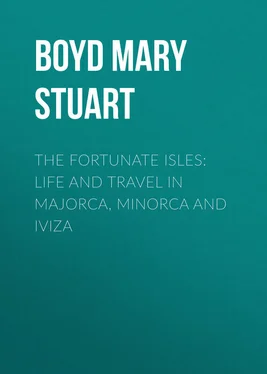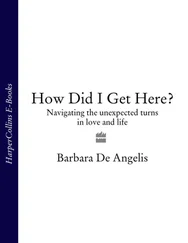Mary Boyd - The Fortunate Isles - Life and Travel in Majorca, Minorca and Iviza
Здесь есть возможность читать онлайн «Mary Boyd - The Fortunate Isles - Life and Travel in Majorca, Minorca and Iviza» — ознакомительный отрывок электронной книги совершенно бесплатно, а после прочтения отрывка купить полную версию. В некоторых случаях можно слушать аудио, скачать через торрент в формате fb2 и присутствует краткое содержание. ISBN: , Жанр: foreign_language, foreign_antique, foreign_prose, Путешествия и география, на английском языке. Описание произведения, (предисловие) а так же отзывы посетителей доступны на портале библиотеки ЛибКат.
- Название:The Fortunate Isles: Life and Travel in Majorca, Minorca and Iviza
- Автор:
- Жанр:
- Год:неизвестен
- ISBN:http://www.gutenberg.org/ebooks/39199
- Рейтинг книги:5 / 5. Голосов: 1
-
Избранное:Добавить в избранное
- Отзывы:
-
Ваша оценка:
- 100
- 1
- 2
- 3
- 4
- 5
The Fortunate Isles: Life and Travel in Majorca, Minorca and Iviza: краткое содержание, описание и аннотация
Предлагаем к чтению аннотацию, описание, краткое содержание или предисловие (зависит от того, что написал сам автор книги «The Fortunate Isles: Life and Travel in Majorca, Minorca and Iviza»). Если вы не нашли необходимую информацию о книге — напишите в комментариях, мы постараемся отыскать её.
The Fortunate Isles: Life and Travel in Majorca, Minorca and Iviza — читать онлайн ознакомительный отрывок
Ниже представлен текст книги, разбитый по страницам. Система сохранения места последней прочитанной страницы, позволяет с удобством читать онлайн бесплатно книгу «The Fortunate Isles: Life and Travel in Majorca, Minorca and Iviza», без необходимости каждый раз заново искать на чём Вы остановились. Поставьте закладку, и сможете в любой момент перейти на страницу, на которой закончили чтение.
Интервал:
Закладка:
When a sudden shower, descending with tropical force made us seek shelter in a doorway whence we watched the passers-by, we had the opportunity of noting that, though all marketing dames wore smart boots, many of them had dispensed with stockings.
A sharp distinction seemed to be drawn in the dress of the classes. As we passed the church of San Miguel, troops of ladies who had been attending morning service were leaving it. With almost the uniformity of a livery, they wore black gowns of brocaded satin. Black mantillas covered their beautifully-dressed hair, and in addition to their rosaries, each carried a fan.
Our temporary shelter chanced to be close to the gate of Santa Margarita, and when the rain cloud had passed over, we went near to read the inscription graven in Spanish on the stone on one side of the gateway: —
By this gate entered into the city on the 31st day of December, 1229, the hosts of King Don Jaime I. of Aragon, Conquistador of Majorca. As a remembrance of that memorable occasion, on which Majorca was restored to the faith and civilization of Christianity, this gate, called "Bab-al-Kofol" in the time of the Islamite dominion, since then "Esuchidor" and "Pintador," and in modern times "Santa Margarita," was declared a national monument on the 28th of July, 1908, and restored at the expense of the State.
The records of the more ancient races who inhabited the island seem to have almost vanished. The Gymnesias, known as the people whose gracious climate rendered the wearing of clothes a superfluity; the Phoenicians, the Romans, even the Balearic slingers, are well-nigh forgotten, while memorials of the valiant young King of Aragon meet one at every turn.
Hunger sent us back to the hotel to have our first experience of the Majorcan cookery for which it is justly noted.
The cheerful dining-room opened into the square courtyard, whose walls were striped in broad lines of blue and white like the bandbox of a French milliner. On each of the six tables was a large decanter of red wine.
The first dish set before us required a certain amount of courage to tackle. It was a mound of amber-tinted rice in which was visible a weird conglomeration of fish, flesh, fowl, and chopped vegetables. The queer part was the preponderance of empty seashells, for while their contents had doubtless become incorporated with the other ingredients, the empty shells remained insistent and uninviting.
But hunger had made us reckless, and on venturing, we found the arroz con mariscos worthy the national esteem in which it is held. Highly seasoned meat of some sort followed. Then came delicately-cooked little fish; then something that defied us to discover whether it belonged to the animal or the vegetable kingdom. There were no sweets, but the dessert was abundant and delicious. Apricots, curiously exotic-looking apples that were streaked with crimson on a pink ground, great clusters of little yellow grapes that seemed as though the sunshine were imprisoned in their skins, and the tempting little baked almonds that are a speciality of Barnils'.
The rain, that in a few minutes had turned the narrow streets into rivers, had ceased as suddenly as it began. The sky was again a deep glowing blue, and the pure soft air was a pleasure to breathe, when ascending a stair we found ourselves on the flat roof of the hotel, which commanded an extensive view over the city. About us were many flat Moorish roofs, some used as gardens, others bearing great cages full of pigeons. To the south was the port with its gay display of shipping and the sparkling waters of the Mediterranean. To north, east, and west, the towers and domes and city walls encircled us. Beyond were the fruitful plains, and farther still the blue mountains.
Around us rose the softened murmur of the town, the chiming of bells, the whisper of the sea, the sound of voices speaking in strange tongues. All was charming, novel, and wholly delightful.
Chopin's description of Palma, written seventy years ago when, with George Sand, he spent a winter in Majorca, needs no correction to-day: —
"Here I am at Palma," he wrote to his friend Fontana, "in the midst of palms, and cedars and cactuses, and olives and oranges, and lemons and figs and pomegranates… The sky is like a turquoise, the sea is like lazuli, and the mountains are like emeralds. The air is pure like the air of Paradise. All day long the sun shines and it is warm, and everybody walks about in summer clothes. At night one hears guitars and serenades. Vines are festooned on immense balconies. Moorish walls rise all about us. The town, like everything here, looks towards Africa. In a word, it is an enchanted life that we are living."
Soon after midnight a deep sonorous cry awoke me from the sleep of the pleasantly fatigued: —
Alabado sea Dios…
Las doce y media…
Sereno…
it rang out in the stillness.
Jumping out of bed, I reached the open window in time to see the passing of a black figure wrapped in a great cloak, the rays from the lantern he carried throwing a wavering circle of light on the pavement beside him. It was the sereno , the guardian of the sleeping city.
Pausing before one of the closed doors, he smote on it three times with his staff. Then he turned, and passed out of sight, his long wailing cry again rising into the night.
II
OUR CASA IN SPAIN
Palma was gay with bunting in honour of the birthday of the young Queen of Spain, when on the afternoon of our second day in Majorca we set out to deliver a letter of introduction that was fated to have an important influence on our future arrangements.
Much might be, and probably much has been written on the uses and abuses of letters of introduction. Sometimes the given letter proves a boon both to him who carries and him who receives it. Was not one of our best friends made known to us through the medium of a perfunctory note from a man we had not seen for many years, and whom the presenter of the note had never even met? When we left London we bore a letter of introduction to an Englishman resident in Barcelona, and he in turn gave us a letter to an American friend of his at Palma, who was Consul for certain of the Southern Republics.
The home of the Consul was at Son Españolet, an attractive little residential suburb about a mile beyond the city walls. The busy district of Santa Catalina lies between it and the sea. Undulating groves of almond and olive separate it from the hills.
Taking the mule-drawn tram-car that plies between Palma and Porto Pi, we alighted at Santa Catalina; and, after making various inquiries, found ourselves ringing the gate-bell of the house, over whose tower fluttered the gay banner of the Consulate.
Had the Consul and his wife guessed that these three British invaders were going to trespass on their endurance for a period of six months, I doubt if they would have received us with such courteous geniality. As it was, their reception was so cordial that within half an hour of our meeting I felt emboldened to reveal what had been my secret desire – that we might rent a furnished house near Palma for the winter. Not a fine house – merely a roof under which we could stow our belongings, a centre from which our wanderings about the islands might radiate.
Could they advise us? Did they think such an idea was feasible?
The Consul shook his head.
"Not near Palma," he said. "At Porto Pi or the Terreno you might chance on one. But these are summer seaside places. Most of the houses there are shut up now. You'd find it dull and inconvenient in winter."
"This district seems delightful, and near town. Would there be a chance of our getting a house here?"
"Unfurnished, yes – furnished, no. But why not take a vacant house and hire what you need? There's only three of you. You don't want much."
Читать дальшеИнтервал:
Закладка:
Похожие книги на «The Fortunate Isles: Life and Travel in Majorca, Minorca and Iviza»
Представляем Вашему вниманию похожие книги на «The Fortunate Isles: Life and Travel in Majorca, Minorca and Iviza» списком для выбора. Мы отобрали схожую по названию и смыслу литературу в надежде предоставить читателям больше вариантов отыскать новые, интересные, ещё непрочитанные произведения.
Обсуждение, отзывы о книге «The Fortunate Isles: Life and Travel in Majorca, Minorca and Iviza» и просто собственные мнения читателей. Оставьте ваши комментарии, напишите, что Вы думаете о произведении, его смысле или главных героях. Укажите что конкретно понравилось, а что нет, и почему Вы так считаете.











![John Bruce - The Lettsomian Lectures on Diseases and Disorders of the Heart and Arteries in Middle and Advanced Life [1900-1901]](/books/749387/john-bruce-the-lettsomian-lectures-on-diseases-and-disorders-of-the-heart-and-arteries-in-middle-and-advanced-life-1900-1901-thumb.webp)
